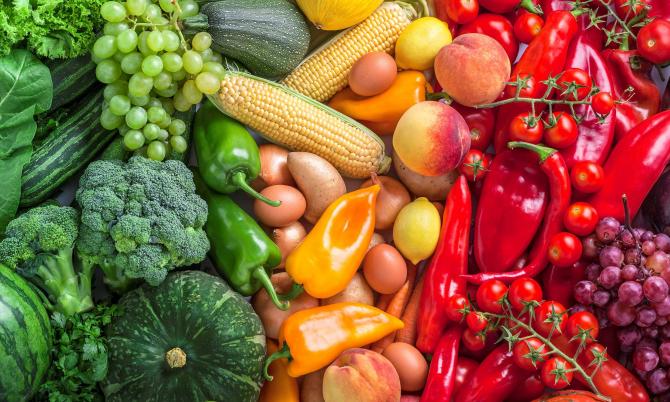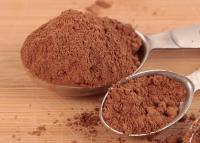
PCOS diet is crucial role in the management of PCOS, not only for weight loss and maintenance, but also to regulate insulin levels. Many women with PCOS are resistant to insulin, resulting in the pancreas producing more insulin in order to be effective.
Insulin and PCOS
Insulin is an important hormone as it transports sugar from the blood into the muscles of the body, allowing the body to effectively make use of the energy from glucose. High insulin levels wreak havoc on the body, leading to a lot of the symptoms of PCOS like, increased hair growth, weight gain, skin tags, fatty liver and high cholesterol, polycystic ovaries and an irregular menstrual cycle, not to mention increased hunger levels and cravings. Sounds familiar, doesn't it? Most of us have many, if not all, of those symptoms.
So, management of blood insulin levels is crucial in the management of PCOS. Refined carbohydrates cause a spike in insulin levels and should therefore be avoided. Also, foods that are high in fat will lead to weight gain and high cholesterol.
Many doctors will recommend a low GI diet of wholegrain, unprocessed foods in the management of PCOS. Metformin is also a drug commonly prescribed for women with PCOS, in an attempt to tackle insulin resistance.
Insulin is not the only hormone impacted by PCOS - Tarryn
BUT, insulin is not the only hormone impacted by PCOS. If it were, we'd all have been diagnosed with Type 2 Diabetes, which we have not. So, our diets need to incorporate low GI foods to manage insulin levels, in addition to tackling other aspects of the Polycystic Ovarian SYNDROME.
Finding the right diet to tackle your PCOS is a highly individual and complex process as the underlying cause of PCOS and different hormone levels will vary from woman to woman.
Here are some of the general PCOS diet guidelines:
Foods to AVOID
High GI (Glycaemic Index) Foods:
Foods that have a high GI result in a quick rise in blood sugar levels. Insulin levels follow suit to deal with the glucose in the blood stream. Generally, high GI foods have been processed to remove fibre and other nutrients so they may be tasty but they are high in calories while lacking in nutrients.
Some examples of high GI foods to avoid: white rice, mashed potatoes, rice cakes, muffins and cakes.
Dairy:
We'll get into more detail in a separate blog post, as it's an important and often overlooked issue. Milk leads to a rise in testosterone levels. It contains a protein that limits normal testosterone processing in the body. With testosterone not being managed, testosterone levels just keep rising. As our testosterone levels are already prone to being high, dairy just makes the problem worse.
Soy Products:
When I cut out dairy, I immediately turned to soy. Imagine my dismay when I found that soy has been implicated in delayed ovulation. Not enough studies have been done on the impact of soy on woman with PCOS and soy in small quantities may have little effect. However, I would not recommend soy products to women with PCOS, especially those that are trying to conceive.
Bad Fats:
Saturated, hydrogenated and transfats are all fats that should be avoided. Saturated fats, found in red meat and dairy products, cause an increase in oestrogen production, hinder the absorption of some nutrients and can cause weight gain.
The trans and hydrogenated fats, from cooked oil, margarine and processed foods, increase your risk of heart disease and diabetes, both of which we are already at risk of as a result of our PCOS.
So, cut down on red meat and get rid of the dairy, for all of the reasons also mentioned under the dairy section. Also, avoid those processed, fatty foods.
Foods to INCLUDE:
Green Leafy Vegetables:
Green, leafy vegetables have the most nutrients per calorie than any other food. They are rich in iron, calcium, potassium, and magnesium, as well as vitamins K, C, E, and many of the B vitamins.
Vitamin B in particular plays a vital role in managing PCOS symptoms. This is also worth a further discussion so I will write a separate post for it. Here are just some of the things that Vitamin B is responsible for: sugar and fat metabolism, thyroid function and hormone balance, amongst others. It plays a vital role in the management of PCOS.
Fruit:
Fruit is a rich source of fibre, vitamins,
minerals and phytonutrients and should be enjoyed as part of a PCOS diet. Many women with PCOS are reluctant to eat fruit or avoid fruit as it can cause a spike in blood sugar levels and therefore insulin.
However, fruit still plays an important role in providing the nutrients we need to combat PCOS. So, try to eat fruit that has a lower GI and have a handful of seeds or nuts with your fruit as protein helps to regulate the sugar spike resulting from fruit.
Fruit with a low GI value include: cherries, plums, grapfruit, apples, pears, apples, dried apricots, grapes, coconut, coconut milk, kiwi fruit, orange juice, prunes.
Coloured and White Vegetables
Brightly coloured vegetables are a rich source of anti-oxidants and should be included in a PCOS diet. Women with PCOS have been found to have a higher rate of oxidative stress. That is, physiological stress is placed on the body when dealing with high numbers of free-radicals. We need antioxidants to combat this oxidative stress.
Organic, pasture-fed meat
This may be expensive but it is important that you eat good quality, lean meat if you do eat meat. Grass-fed meat tends to be leaner and contain less hormones than standard meat. Grass-fed is also important because livestock is often fed grain and feed that has been genetically modified or contains pesticides which are unhelpful for hormone balance and PCOS.
Healthy Fats:
Not all fat is bad and healthy fats are essential for your PCOS diet.
Essential fatty acids are really important for maintaining the cell wall, which allows nutrients in, and toxins out. They are also vital for hormone balance, weight management and fertility.
These healthy fats are found in nuts and seeds, oily fish, avocado and olive oil so be sure to incorporate those into your diet.
Supplements:
Following the diet described above will give you a good chance to get all of the vitamins and minerals you need but many women with PCOS are still lacking in some nutrients.
So, make sure that you take a good multivitamin and mineral supplement. It should contain the following Vitamins and minerals: Vitamin A, D, E, C, B1, B2, B3, B6, B12, folic acid, magnesium, iron, zinc, chromium, selenium and manganese.
This should provide you with a good supplemental basis. Many women with PCOS also take a Vitamin B complex, Vitamin D, chromium, Omega 3 and Ovasitol.
Managing Insulin Resistance
Eat wholegrain foods instead of processed, refined foods. Also, whole fruit instead of fruit juice will maintain insulin and blood sugar levels.
Eat foods that are high in fibre as they will also cause a slower, more controlled rise in blood sugar and insulin levels.
Incorporate legumes and vegetables in your diet as they're high in fibre and nutrients and will manage your sugar levels.
Combine protein and carbohydrates as protein helps to regulate the blood sugar spike caused by the carbs.
Eat small, healthy meals more frequently to manage cravings and hunger pangs and NEVER miss breakfast!
Is it even possible?
I know that looking at that diet can be a bit mind boggling and you may be wondering if it's even possible to stick to a diet like that, especially for us carb lovers.
I have personally found it easier to make a clean break and take the leap into a new diet. The longer I ate the carbs, the more I craved them. Within a week a giving up junk food, my cravings reduced significantly.
Lifestyle changes:
Whilst diet is hugely important aspect to tackling PCOS, we must not forget other lifestyle changes that will help to overcome PCOS and it's symptoms.
Exercise regularly
Manage stress levels
Share the burden and get good support from your family and friends.
Look after yourself and pamper yourself. We need to reclaim our womanhood and femininity so a little bit of TLC is definitely in order.
There is NO Cure
It's important that we understand that there is no cure for PCOS and there is no magical formula that's going to make us all better. But, by making these diet and lifestyle changes now, we can manage our symptoms, hopefully have happy families and lead fulfilled lives where we are happy with our bodies and the way we look.
It's not an easy road that we face but it helps to know that there are thousands out there who can share our journey, encouraging us to stick to the path and kick PCOS in the butt.
Watch Video




